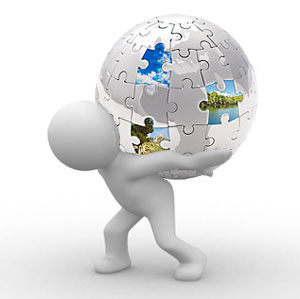
NGOs play an essential and integral role in the sustainability and growth of our communities and environment. They deal with a wide spectrum of topics including but not limited to orphans, elderly, recycling, global warming, advocating rights, economic development, education, awareness…etc.
For more than 12 years, I’ve been passionately involved in NGOs and along the road I managed to create some, or be on the Board or advice & consult others. Throughout the years, most of the NGOs I’ve known have been managing projects and programs. They design projects, write proposals & budgets, implement projects, evaluate them and so on and so forth. Yet I long to see some common project management terminology, standards or methodology on how to do all this.
Years ago, the private sector has identified certain standards for project management, best practices, processes, tools, techniques..etc. These standards are helping corporations in all shapes and sizes, from the multi-nationals to the small local enterprises, in achieving their projects on time, within budget and fulfilling the necessary scope. Yet, surprisingly, and in-spite of the fact that most NGOs work on projects; we somehow missed the idea of having an agreed on, industry-wide standard, best practices and methodology . So you might ask yourself and what if we don’t have a standard, what does it really matter? The fact is, many NGOs miss essential project milestones, have projects that go over budget, short of scope and delivered their outputs behind schedule, if delivered at all. Time, effort and money spent to lead to a positive impact on the society sometimes are lost do to lack of proper project management (from planning to implementation to monitoring & evaluation)…but the question is why?
Lebanon alone hosts thousands of registered NGOs as per the Ministry of Interior. Majority of those NGOs are project and program based and depend on ongoing grants and funding to secure resources for their projects. With grants and funding summing up to millions annually, the amounts being lost on failed projects, unmet objectives and re-work is counting up to hundreds of thousands of dollars. That’s if we’re only talking about the monetary value of things. On the other side, consider how many lives could’ve been saved with the same amount of money that has been lost or re-budgeted, how many schools could’ve been built, how many trainings would’ve been developed, campaigns launched…etc.
Many leaders of NGOs consider this as a reasonable and un-escapable price to pay due to the fact that it is a volatile and ever changing industry that becomes active in disasters and emergencies, rather than in times of peace and order. Thus adequate time for planning and assessments isn’t always available. Moreover, I’ve heard several times from people working in the NGOs industry, that it is hard to recruit enough qualified project and program managers. Mainly it is due to the short period of engagement in temporary projects, low wages with respect to private sector and lack of well-identified project management standards, training, tools and techniques.

Yet what many don’t realize is that things are much simpler than that. In most cases, there is no need to recruit highly qualified project managers, if you can build the capacity and empower those that are already there. As for the standards, trainings, tools and techniques, they do exist! The same standards that apply for the private sector, governmental sector, army and others…apply for NGOs, with minor customization. There are two internationally known standards for project management: Prince & PMP. Both of which are very popular, with the second being of a bigger base of certified professionals worldwide.
With thousands of program and project managers/coordinators and teams in NGOs… there is a considerable gap to be filled for both the organizations and the individuals working in them.
We, those passionate about NGOs and the community, should not keep on managing our projects based on serendipity. It’s about time we get our Project and Program leaders trained and certified to live up to their responsibilities and get that impact we are so passionately working for!
We owe it to ourselves, our donors & supporters and most importantly to the community we are serving…so what are we waiting for?!
Other Interesting Posts:





